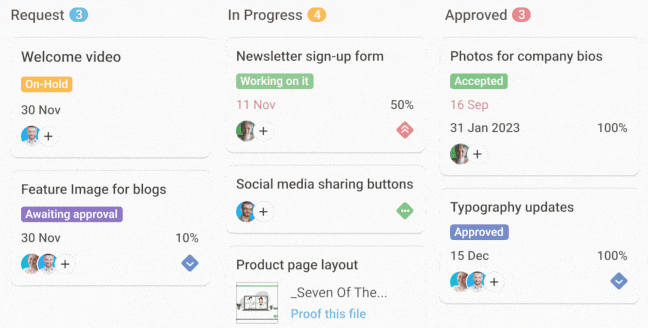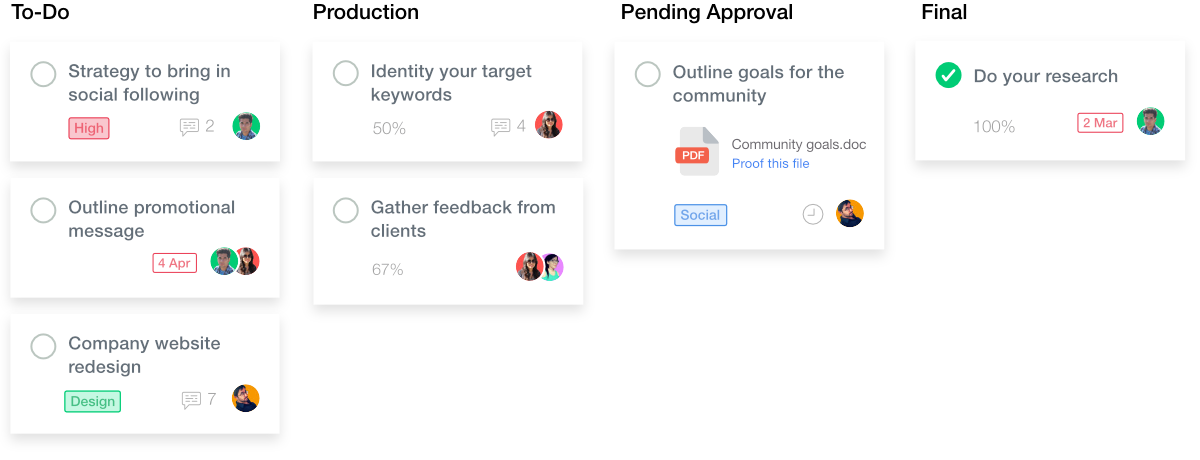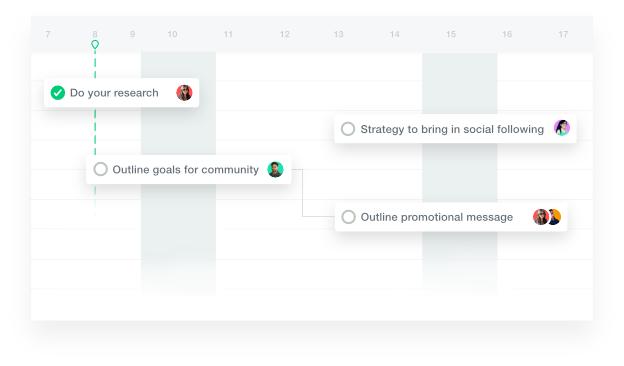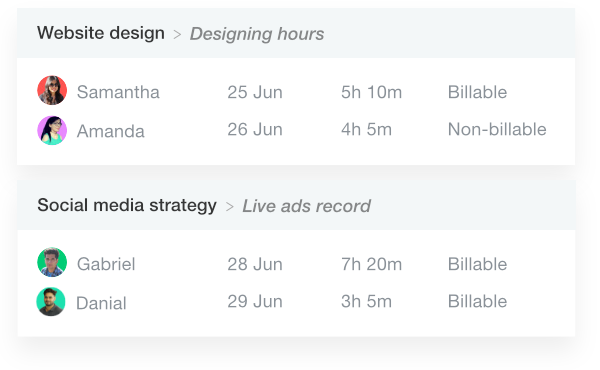Have someone ever asked you, what you want to become in life?
To which, you think for a little while and reply with confidence that, “ I want to work in some role in XYZ company” or “I want to be a businessman or an entrepreneur in ABC Industry”.
But why do you have to think so much before telling exactly what you want to become or achieve in your professional life?
Well, it clearly means that either you are unsure of what you are aiming for in your life or you actually don’t know how to set foot on the path that leads to success.
Being the Founder and CEO of ProofHub, I interviewed many individuals who I found to be talented and very good at what they do. However, when I asked them a common question – What are your career goals and how are you planning to achieve them, they threw some really vague answers.
What’s the reason?
According to me, they are unable to think and plan their professional life beyond a certain point from now, which is let’s say 2-3 years.
However, little do they know, this may have a bad impact on their career.
People who do not emphasize setting career or professional goals usually have to settle with limited accomplishments at work.
If you also have little to no idea about career goals, you do not need to worry at all.
In this article, I am going to explain everything important about career goals. Also, I will list down some of the most common examples of career goals that you must know.
What are career/professional goals?
Career goals are milestones that assist you to get closer and achieve your long-term career targets. While many people believe that the career goal of an individual is all about the profession that he/she wants to pursue throughout his/her life, this is not completely true.
When you set career goals, you have to be clear about the profession that you are willing to pursue. However, career goals are also about the steps that you need to take to become successful in your profession.
Why set goals for work?/importance of career or professional goals
Now that you know what career goals are all about, it’s time for you to understand why setting career goals is important for you. Here are some key points, that highlight the significance of career goals:

Helps you to stay focused
When you set goals or targets, you give direction to your efforts. You exactly know where you need to channelize your energy to bring the intended results. Moreover, your chances of shooting pointlessly and wasting your efforts become minimum when you know exactly what you are aiming for.
It becomes easy to measure your progress
It’s quite crucial to measure your progress regularly because it will help you to ensure that you are on the right track. By setting career goals, you get an easy way to see yourself growing and measure how much progress you have made since the last time. Moreover, if you found your progress to be lower than anticipated, you can make changes to your strategy or devise a new one accordingly.
You take responsibility for your actions
Another good side of setting goals for yourself is that you take responsibility for your actions. You will value the appreciation that you get for your efforts and consider it a motivation to keep up the good work. But success is just the one side of a coin, and often, you have to collide with failures too. Being accountable for your work, you can always take the criticism in a positive way to make improvements to yourself.
Makes you happy and satisfied
One of the biggest factors that make us happy and satisfied with our work is the sense of achievement. It is quite common for everyone to feel good about themselves when they hit their targets. Short-term goals allow you to get that sense of achievement quite often. Every time you accomplish a goal, you have a good reason to celebrate and feel proud.
How to set career or professional goals?
Goals give direction to life.
Working without any goals in your life is like launching a rocket without defining its destination or the target that it needs to hit.
Here’s a famous quote by Bill Copeland that highlights why we all need to be serious about setting goals:
“The trouble with not having a goal is that you can spend your life running up and down the field and never score.
Now, you may be thinking – How can I set career goals for myself that are realistic and achievable?
Here are some important factors that you need to consider while setting professional goals:
- Know what’s your passion and what kind of work you want to do that will make you feel cheerful
- Every individual has his/her own set of strengths and weaknesses. Identify what your strengths are and how you can take advantage of them in your work. Also, acknowledge your weaknesses and see if you can eliminate them or transform them into your strengths
- All types of work come with challenges, but the intensity of the challenge in every work varies from others. So, you need to be clear of how much pressure you are willing to take and overcome challenges that come on the way
- You need to give serious consideration about whether you want to set up your own business or work for others
- For almost everyone, money is like – the more, the better. However, to earn money, you need to work. It’s good to set a bar on how much money you are expecting to earn by working in a specific industry or a job role.
Once you know what exactly you want to chase in your professional career, it’s time to set some goals.
However, the goals that you are establishing shouldn’t be normal but SMART.
From SMART goals, I mean that your goals should be :
S – Specific
M – Measurable
A – Action-Based
R – Relevant
T – Time-Based
Now, I will tell you briefly about each quality that a SMART goal possesses:
- Specific – Specific means that a goal should have an easily identifiable purpose or endpoint. For example, working in a marketing agency as a social media marketing expert in XYZ location is a specific goal.
- Measurable – It should be easy to measure the goal in numbers. For example, aiming to get a job with weekly working hours of 40 and monthly compensation of $8,000.
- Action-Based – A goal needs to be realistic so that one can take one or more actions to accomplish it.
- Relevant – Each goal needs to be aligned so that they fit in the overall big picture. For instance, setting the goal to learn a project management tool is completely relevant if one is pursuing to become a project manager or team leader.
- Time-Based – Time is limited for everyone. Every goal should have a certain time limit during which it needs to be accomplished.
For setting SMART goals, you will need a smart tool like ProofHub, which also makes it easy to track your goals. You can add and link multiple tasks/activities that you need to complete in order to achieve a specific goal of yours. Moreover, the tool lets you specify the due time for each task and create task reminders to make sure that you never stop making progress towards your goals.
Common career/professional goals examples
Usually, career goals or professional goals are classified into two different categories based on their time duration: short-term career goals and long-term career goals.
While short term goals are planned for the near future, the long-term goals are the ones that have a timeframe from several months to several years. Additionally, short-term career goals act as milestones or stepping stones to achieve a long-term goal.
Short-term career goals (Examples)

Develop one or more (relevant) skills
To work in any field or industry, you need to learn skills that’ll help you to get hired. You also need to update and diversify your skillset from time to time in order to stay competitive and get better opportunities. However, one crucial thing to keep in mind is that the skills you are learning are relevant to the profession that you want to pursue or already pursuing.
Make yourself impressively good at communication
Communication is of the utmost importance when you want to be successful in your career. When you are good at interacting with people and expressing your thoughts in front of others, you are likely to get recognized. Moreover, communication is the backbone of many other skills such as teamwork, leadership, and negotiation. You can hone your communication skills by observing and learning from people around you or opt for special communication courses.
Start working as an intern to practice your skills
Learning skills is simply not enough to work in a professional environment, you must know how to implement them. Don’t worry if you haven’t got an internship offer from a leading organization in your field. It really doesn’t matter from where you have started your professional career in the long run. If you have the right skills and knowledge to implement your skills in real-life situations, you are definitely going to make it to the top. So, all you need is to enroll yourself for an internship and gain practical knowledge.
Expand your network
A strong social and professional network can provide you a sea of opportunities and also help you to excel in your career. You need to interact with people in a natural way to develop strong bonds rather than doing it forcefully. It’s good to expand your network so that you can share your thoughts, get helpful feedback, and get the right guidance to succeed in your professional life.
Interact with technology and learn to use tools
This is one of the short-term goals that are common to people willing to work in any industry. As technology has taken over almost every sphere of business, there’s the need to learn and stay updated about leading or common technologies. For instance, people who are into sales need to know and use CRM software to boost sales and improve customer relationships. Similarly, project managers who have the responsibility to handle multiple projects and teams at a single time need to make use of project management software.
Looking for a comprehensive project management tool to keep your projects well-organized? Try ProofHub today!
Long-term career goals (Examples)

Get a professional degree or certification
To earn a professional degree or certification, you need to study and learn things for years. But you should be clear about what profession you would like to pursue before making any decision regarding the degree or certification that you are opting for. You definitely don’t want to waste all the money and time needed to earn a degree that is irrelevant to the field you want to work in. When you have a degree or certification related to the career that you are willing to follow, it will make your journey (at least for the initial part) much easier. You will be able to learn new things and gain all the essential knowledge to get a good start.
Achieve expertise in your field
To achieve expertise in your area of work, you need to put consistent efforts and keep learning for many years. By becoming an expert in your field, you will become a worthy asset for any organization and also your earnings will grow handsomely. Just be sure that you develop yourself personally as well as professionally throughout the years that you have been working.
Aim for a managerial position
At some point in their career, most people develop the ambition to work at a managerial position in their organization. However, not everyone is fit for the responsibilities that managers have to assume. A manager has to be a good leader as well as a knowledgeable person and should possess skills, including creativity, intuition, commitment, and versatility. If you believe that you have almost every quality required to manage projects and teams effectively, then you should go for it.
Look for better ways to manage your work and time
To stay productive and deliver better output, the basic thing that you need to do is to manage your time and work smartly. You can make use of tools such as a time management tool that will make it easier to schedule your tasks and stay on top of all your work. By developing your time management skills, you will be able to do more in less time. Moreover, it will become possible for you to spare time to learn new things and implement them at work when you are not racing against time.
Manage your goals with ProofHub

ProofHub overview
ProofHub is basically a project management software, but it has several features that come in handy when you are chasing your long-term career goals. It is also among the top-rated software for managing time and tasks all together from a single place.
Irrespective of your profession, you need to work on several projects and coordinate with your teams to bring good results. ProofHub combines all the essential tools that you need to stay on top of your work and excel in your profession. It is an ideal tool for becoming good at time management, task management, and team collaboration.
Key features that help you achieve your career goals
Once you choose your career path, you need to stay sharp and dedicated to your work to achieve your professional goals. Here are some of the key features of ProofHub that will help you accomplish your small steps toward achieving your goals successfully:

Managing projects and tasks effectively plays a major role in helping you get the recognition at work and climb up the ladder of success. The Kanban boards in ProofHub allow you to streamline all the project work and create a workflow for the smooth execution of every task. You can see tasks moving through different stages and always stay updated about the status of a project.

If you want to perform exceptionally in a managerial position, you need to be good at organizing projects and completing them on time. A Gantt chart will give you the timeline view of a project and you will be able to visualize and track the schedules of all the tasks of a project. You can also get information about a task like who’s working on it and if it’s dependent on other tasks.

Use timers and timesheets to track and record all the time spent on individual tasks and projects. You can also get time reports to see how much time you have individually dedicated to different tasks. By having access to precise time data, it would be much easier to manage your time effectively.
How much do you need to pay?
For information on our pricing plans, kindly visit our pricing page.
Want to try ProofHub and discover all of its features that can help you to chase your career goals easily? Sign up for Free now!
To sum it up
Success doesn’t come overnight, you need to set goals and plan your actions accordingly. To make progress in your career, you need to set both short-term and long-term professional goals. Just make sure that you consider all the essential factors for setting clear and meaningful goals. The most common short-term and long-term goals that I’ve mentioned in the article will give you a good idea about how your career or professional goals should be.

